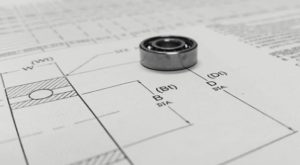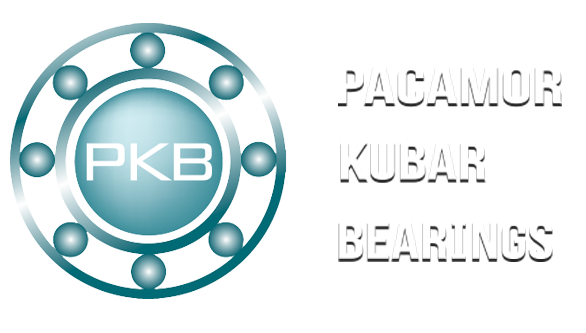FAQs
Ball Bearing FAQ 
- What is the difference between using a shield or a seal as a ball bearing closure?
- What is the purpose of the bearing retainer and what benefits accompany different retainer materials?
- What are ABEC and ISO standards?
- What is the purpose of bearing lubrication?
- Is grease or oil better in my application?
- What causes bearing noise?
- What factors increase or decrease bearing torque?
- Can I use a ceramic hybrid ball bearing without lubrication?
- Can I use a ceramic hybrid ball bearing instead of a steel ball bearing?
- Can PACAMOR KUBAR BEARINGS provide products outside of its standard product offering?
- Can I meet my SBA requirements by sourcing bearings from PACAMOR KUBAR BEARINGS?
- I do not see a design to fit my application in your catalog. Can you help me design a custom bearing?
- What types of ball bearings are manufactured at Pacamor Kubar Bearings?
What is the difference between using a shield or a seal as a ball bearing closure?
Shields or seals are often installed to retain lubrication and to prevent contamination from entering the bearing. While a shield contacts the outer ring and does not come in contact with the inner ring, the seal generally comes in contact with both the inner and outer rings. Torque or drag is lower with a shield than with a seal. Alternately, the seal provides a higher degree of protection from contamination. Shields and seals are available in a variety of materials and configurations. Take a look at our components section for more information.
Please contact a PKB engineer for technical assistance with any special requirements.
What is the purpose of the bearing retainer and what benefits accompany different retainer materials?
The retainer (also called a cage or separator), is used to separate the balls and equally position them around the bearing raceway. Some retainer materials contain lubricant for extended bearing life. Retainers for ball bearings are generally available in two designs. The most universal is a 2-piece closed ball pocket design called a ribbon retainer. A single piece open ball pocket design is called a crown retainer. Crown retainers are available in a variety of metal and non-metal options. PACAMOR KUBAR BEARINGS offers 440C steel retainers in both crown and ribbon designs and machined retainers in various materials. Phenolic and Torlon retainers for instance, are excellent options for high-speed applications. Torlon offers additional bearing life under steam autoclave conditions but requires regular lubrication at maintenance intervals. Phenolic is very forgiving under lube-starved and low maintenance environments.
What are ABEC and ISO standards?
The Annular Bearing Engineers Committee (ABEC) of the American Bearing Manufacturers Association (ABMA) establishes standards for manufacturing precision ball bearings. These standards are also accepted by (ANSI) American Standardization Institute and by international agreement for the standards developed by the International Standards Organization (ISO). The ABEC and ISO bearing standards primarily define tolerances for the ball bearing rings. These standards do not define many other aspects of the bearing such as lube, radial play, ball complement, retainer type, torque, cleanliness, etc.
What is the purpose of bearing lubrication?
Bearing lubrication is an essential element of bearing selection, as it:
- Extends fatigue life of the bearing by reducing wear and friction between the mating components of the bearing assembly.
- Prevents corrosion and extends shelf life.
- Provides a level of protection from foreign material entering the rolling elements.
- Reduces the noise level of the bearing, lowers torque, and assists the bearing in reaching maximum operating speed.
Is grease or oil better in my application?
Grease consists of a base oil in a thickening agent. The thickening agent extends operational and shelf life by slowing the migration and evaporation of the oil. Grease is recommended for low speeds and less torque sensitive applications. Oil is recommended where low torque or high rotational speeds are a consideration. Many popular oils are generally the same as those used as base oils in greases. PACAMOR KUBAR BEARINGS offers a wide range of oils and greases for a variety of applications. Please contact a PKB engineer for technical assistance with any special requirements.
What causes bearing noise?
Bearing noise is a function of both the bearing and the way it is used. Bearing noise is not generally influenced by ABEC and there is no fixed standard among bearing manufacturers for acoustic noise. Some external factors which affect bearing noise include, lubricant type, excessive bearing load, and improper installation.
What factors increase or decrease bearing torque?
Factors that increase bearing torque include:
- Increased number of balls in the bearing
- Tight crimp ribbon retainer
- Tight radial play
- High lubricant viscosity
- High lube fill in the bearing
- High applied bearing load
Factors that decrease bearing torque include:
- Fewer balls in the bearing
- Crown type or loose crimp retainer
- Loose radial play
- Low lubricant viscosity
- Low lube fill in the bearing
- Low applied bearing load
Can I use a ceramic-hybrid ball bearing without lubrication?
Ceramic-hybrid ball bearings have demonstrated the capacity to operate under reduced lubrication conditions with success. In many ball bearing applications, the primary cause for bearing failure is due to lubricant breakdown. This lubricant breakdown is often a result of microwelding between the materials of the balls and races. Substituting silicon nitride balls for steel balls is a relatively inexpensive solution for improved bearing life. PACAMOR KUBAR BEARINGS recommends that all bearings contain at least a small amount of lubrication to protect the ball bearings during shipment and installation into your device.
Can I use a ceramic-hybrid ball bearing instead of a steel ball bearing?
Silicon nitride is the typical ball material in a ceramic-hybrid bearing. The primary use for hybrid bearings are to extend bearing life by reducing wear. Ceramic balls in a bearing with stainless steel races have been proven to reduce lubricant breakdown and bearing wear. Advantages of a ceramic-hybrid bearing include:
- Smoother running bearing, less vibration and noise
- Reduced centrifugal loads as the balls spin against the outer ring, due to lighter weight ceramic balls.
- Increased bearing life
- Lower bearing temperatures at high rotational speeds
- Reduced lubrication requirements
Can PACAMOR KUBAR BEARINGS provide products outside of its standard product offering?
While PKB’s primary focus is on the wide array of products manufactured at the Troy, NY factory, we can provide parts outside of our manufacturing capabilities. Quantities for non-catalog pieces would need to be higher, to cover tooling costs, et cetera. Simply contact our sales department with your inquiries.
Can I meet my SBA requirements by sourcing bearings from PACAMOR KUBAR BEARINGS?
Yes, PACAMOR KUBAR BEARINGS is an American Owned and Operated small business registered with the System for Award Management(SAM). We are a privately owned and operated American business. PACAMOR KUBAR BEARINGS is located in the Rensselaer Technology Park in Troy, NY. We manufacture all PKB bearings at this location. S/N Precision Enterprises Inc., dba Pacamor Kubar Bearings (cage code 14927).
I do not see a design to fit my application in your catalog. Are you able to assist me?
Yes, technical expertise is available to help with bearing engineering for custom products. Available options include, but are not limited to, custom rings, retainers, balls, shields, lubricants, and packaging. We look forward to working with you to satisfy your rolling element requirements. Please e-mail sales@pacamor.com, or call 518-283-8002.
What types of ball bearings are manufactured at Pacamor Kubar Bearings?
We make 440c stainless steel precision-miniature & instrument ball bearings. These include, thin-section ball bearings, angular contact ball bearings, annular bearings, deep groove, duplex, and full-complement bearings, in standard inch and metric sizes. They are manufactured at our ISO quality certified Troy, NY production facility. Please view the Pacamor Kubar Bearings standard ball bearing catalog for an introduction to our offerings.
S/N Precision Enterprises Inc., dba Pacamor Kubar Bearings – Cage Code 14927






